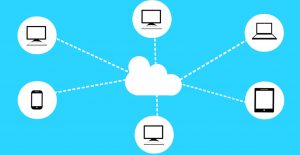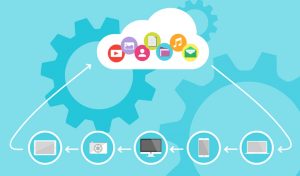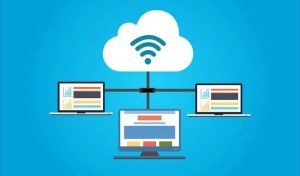Advantages And Disadvantages Of Cloud Computing: Cloud has changed the way in which consumers and businesses interact with the internet, software and data storage, and this is something which has come to stay with no prospects of changing anytime soon. About more than 90% of businesses use cloud in many capacity.
Recommended: Differences Between Alpha, Beta And Sigma Male
Meaning of Cloud Computing
Cloud computing is a term used to refer to the storing and accessing data over the internet. When using cloud computing, it does not store data on your personal computer’s hard disk. You can always access data from a remote server when using cloud computing.

Before going into the cloud computing advantages and disadvantages, it is important that you remember that cloud computing is not just one thing. It includes about three distinct areas, they are:
a. IaaS – Infrastructure as a service
b. PaaS – Platform as a service
c. SaaS – Software as a service
Although the advantages and disadvantages of cloud computing tends to hold across all three areas their importance does vary according to the area you are focused on.

Also see: Differences Between the first and second generation computer
Advantages (Merits) of Cloud Computing
We would be discussing the advantages of cloud computing.
1. Cost Reduction: There is a financial principle which we all know, and that is profit comes from making more money than you spend. Regardless of the quest to make more profit than you spend, everything which relates to computers do not come in cheap. So when it has to do with cloud computing advantages, this is at the top of the list for most businesses.

When business owners make use of good servers instead of cloud computing, the good servers would cost the users like thousands of dollars just on hardware. Not including the hardware and software maintenance which are done routinely. You would also need a secured room to set up the system. If such a room for holding hardware does not already exist in the building, then one needs to be built on site. Also the servers would also be needing constant cooling system in other to work properly, therefore get ready to have your bills skyrocket as a result of air conditioning cost.
All these expenses could lead a company into going broke for buying all the software licenses for high-end programs. With the use of cloud computing, it solves these problems for the businesses. Cloud providers takes care of the infrastructures, utility management and maintenance for the servers.
Also see: Most Expensive Cars in the World 2022
2. Security: Regardless of some cloud data breaches, many have argued on the fact that cloud computing is more secure than an in-house computing. One of the things at the top of the list of cloud computing is that cloud providers are under more scrutiny and they must abide by the established standards.

While businesses on the other hand are under the obligation to protect their customer’s information, which they abide by as far as their own power with regards to cloud computing goes. Data which are held in cloud are less subject to an employee’s theft. It is way easier to steal employees or companies information when you have physical access to the machine where it is been stored. Cloud computing creates a bridge between potentially disgruntled employees and your data.
The cloud providers knowing that their business depends on their ability to provide a secured channel for their users, will make it a point of duty to always upgrade their security protocols and make sure that their software are up to date. There are great chances that the cloud providers have full time staff whose specialty is digital and network security, which many independent business cannot boost of.
3. Reliability: Unless a server’s hard drive is backed up in a Redundant Array of Independent Discs (RAID), when there is a hard drive failure, all of the data and the server-based applications would become unavailable immediately and they may end up being lost in the end. This can be likened to a nightmare, and it is in fact referred to as such. However, this does not occur when the business is using cloud computing, this is because clouds survive redundancy. Data in clouds are not just stored in your personal computer or on your server but on multiple servers.
This also depends on the cloud providers as some providers may even store the files on servers in multiple locations. Just in case they encounter a problem in one particular location as not all servers will crash at the same time.
This simply implies that no single hardware failure will destroy your business or change your business activities. It also means that you can go to sleep with your eyes closed because you are expecting superb reliability in terms of accessing your services or data. Most cloud providers guarantee 99.99% uptime.
Also see: Differences Between “Few” And “A Few”
4. Excellent accessibility: Cloud computing allows users to easily store information and also access those stored information’s from anywhere in the world just by simply connecting to the internet. Cloud increases a business productivity by making sure that its data is always easily accessible at any time.

5. Unlimited storage capacity: Another advantage of cloud computing is that it offers unlimited storage space, as much as you can afford and these space could be used to store videos, documents, audios, images, software’s and lots more in one place.
Also see: How To Make Reading Fun and Interesting
Disadvantages (Demerits) of Cloud Computing
1. Downtime: This is probably the greatest disadvantages of cloud computing, when we mention downtown, it is not about server downtown, but about your personal internet access going down. So long as you do not have internet connection, there is absolutely nothing you can do with the cloud at your disposal.

However, with enough data plans you can find yourself reconnected to the clouds, of course, they are capped and mobile devices will not stay on all the time as they have limited battery life. I am certain you would have bigger concerns than reconnecting into your cloud services when the power goes off.
2. Security: You may be wondering, did I not just mention security as one of the advantages of cloud computing? Well yes I did, this is because on one hand, security is an advantage of cloud computing and on the other hand, it is a disadvantage.
Imagine this scenario, you have a security system and security cameras which activates when you lock the door, but to make sure your home is save, you have to lock your door to activate the security systems. This means that when the doors are unlocked, your home is not secured and is opened to anyone who cares to enter.
When it comes to cloud computing, the fault is usually from the user, as he is the weak link in all security systems. When you do not take appropriate security measures, then your cloud could be likened to sandwich left in the park. Therefore security can be a disadvantage when the user decides to be careless about their security, allowing outsides to pry into their cloud.
Also see: Most Technologically Advanced Countries in the World 2022
3. Cloud Service Closes shop: Unlike companies which has existed for a very long time, cloud computing is a very young industry which has lots of companies vying for business, there is always a possibility that the cloud providers may run out of money and go out of business forever as the case may be.
Now, think of cloud computing as a warehouse which you have filled with goods, once those goods has been stored there, it will be difficult to move it from that position to the another. Now imagine how it will feel like to lose all the goods in the warehouse if the owner of the warehouse goes bankrupt. That is exactly what happens when a cloud service closes shop.
4. Limited control: It is no news that cloud infrastructure is totally owned and managed by a service provider, therefore making the owner possess less control on the files, functions, or the even the execution of services within the cloud infrastructure.
5. Performance can vary: When working in a cloud environment, the application which is running on the server, provides information and resources to other businesses at that same time. This means that any attack on your tenant could affect the performance of the source which you shared.
Recommended: Most Expensive Cars in the World 2022
In conclusion, when considering the advantages and disadvantages of cloud computing, it is important to have in mind that the cloud service providers are very much responsible for all the advantages but however, they are not all responsible for all the disadvantages.

Edeh Samuel Chukwuemeka, ACMC, is a lawyer and a certified mediator/conciliator in Nigeria. He is also a developer with knowledge in various programming languages. Samuel is determined to leverage his skills in technology, SEO, and legal practice to revolutionize the legal profession worldwide by creating web and mobile applications that simplify legal research. Sam is also passionate about educating and providing valuable information to people.